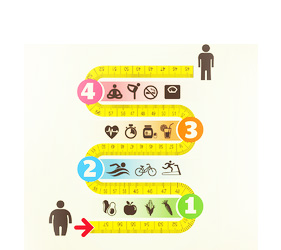97% gain back the weight

One of my friends recently told me of a "revolutionary" diet shake that helped one of her friends lose nine pounds in one week!
Elated by this success, his entire family was mobilized to purchase the product that led to this fantastic weight loss. I have little doubt that they will be able to lose weight with this product, but I know conclusively that, like me, their weight loss would be temporary and fleeting. So I simply took a deep and sad breath. I knew I was probably not going to be able to persuade her out of this euphoric discovery and the dream of arriving at overnight thin paradise.
The companies that continue to seduce us into believing that losing weight is as simple as buying their product know that there is a lot of money to be made with any product that causes rapid weight loss. They don't have to guarantee that anyone will be able to keep that weight off. They make plenty of money with no accountability for the resultant damage they inflict, and the fact that at least 97% of their supposed success stories will gain more pounds than when they started the program.
Most of us have experienced the truth about diets. We have disciplined ourselves and endured months of low-fat, low-carb, low-sugar or low-calorie regimens, even cleanses or fasts. We sweated through Zumba, kick-boxing, yoga, step-aerobics, anything that had the slightest chance to help. We worked very hard and very diligently on these programs. After a lot of hard work, we were thrilled as we watched the scale consistently move lower and lower, where perhaps one day we would finally and conclusively reach the Promised Land: our desired weight.
After living this scenario over eleven times with different diets, different exercise programs, and while seeing my friends experience similar results, I sat down to contemplate the most fascinating statistic of the weight lost industry:
Only 3 out of every 100 persons who reach their weight goal can maintain their achievement beyond the first year. Take one solid minute to truly ponder the consequences of that statistic.
Visualize yourself as part of a group of 100 enthusiastic, committed people, who through food restriction and significant exercise generate a caloric deficiency. Now visualize that this group also has the perseverance and stamina to stick to that regimen for weeks, months, whatever is necessary, AND imagine that all of the members of this admirable group actually reach their weight goal. Horay! What an amazing achievement!
One year later these 100 extraordinary people reconvene and to their shock only three remain stable in their weight loss. The remaining 97 have either returned to their weight prior to the regimen, or have actually gained more weight than when they started the program! Only three, 3, not even nine, but three, have managed to keep the weight off!
Are we really that spineless? Do we really lack that much willpower? Or is there another explanation? If you conduct a postmortem with the 97 persons that could not hold on to their hard-fought weight loss, what you would find is that after they attempted to go back to normal eating they experienced hunger far more often than prior to their weight loss program. They also would have become far more preoccupied with food since ending the program.
There is a little known organization named the National Weight Control Registry. In 1994, Rena Wing, Ph.D., professor of psychiatry at Brown Medical School, and James O. Hill, Ph.D., director of the Center for Human Nutrition at the University of Colorado established this database. The registry tracks individuals that have managed to maintain more than 30 pounds of weight loss for more than one year. The objective of this registry is to learn what exactly helps these individuals hold onto long-term weight loss. In December, 2011, The New York Times published an article about the registry and interviewed some of these extraordinary individuals. They shared how they have had to maintain hyper-vigilance to retain their lost weight. Many of them still have to count calories every single day; some of them call ahead to restaurants before they attempt a meal out. In other words, their weight maintenance efforts are as much work as losing the weight itself. It is a time-consuming, control-based, lifelong commitment, predicated on unwavering willpower that is far from ending once they reach their weight objectives.
Beyond the off-the-shelf diet products, there is now scientific data that has unequivocally proven that eating five small meals per day composed mostly of leafy greens with lean protein allows us to shed the pounds in a matter of weeks.
I have also watched friends who basically quarantined themselves from the rest of the world and obsessively counted fat, carbs, or calories for months and emerged as a slender butterfly from their dieting cocoon. While I know that my friend and her family will lose weight while they are drinking their shake, losing weight is not the critical insight, and it is not the point of my book. We all know that if we experience a caloric deficit caused by reducing our food intake and/or increasing our exercise, we will lose weight. After growing up with a diet industry where there are pills, shakes, packaged meals, and pre-cut vegetables, I - like millions of women - know how to lose weight. But the statistic remains; the weight loss is only short term!
Most people, including those who have lost the weight, are flabbergasted by our inability to keep the weight off. After all, the food doesn't jump into our mouths. They believe that the issue is lack of willpower or lack of dietary insight. Many people have seen this 3 out of 100 weight loss maintenance statistics and continued to hope that this year's novel and innovative dietary or exercise approach will do it for them. But I was mobilized to examine exactly why this happens, why 97% of us who go through that diet/exercise journey don't maintain the weight loss.
What my book will show you is that in continuing to pursue these types of weight loss approaches, we are not only merely addressing the symptoms of weight gain. We are strengthening what keeps us eating compulsively.
Once our brains are food obsessed, our innate ability to eat in a self-nurturing manner for the rest of our lives has been compromised. Until we re-wire our brain to cease its obsessive food fantasies and re-learn how to eat without compulsion, we are not addressing the overweight issue at its source. Lifelong health is predicated on a brain that is not food obsessed. If all you want is to just lose the weight, you can stop reading at the end of this paragraph: Simply eat leafy greens, leafy greens, and more leafy green vegetables with a generous dosage of high quality healthy protein and voila! Back to a small size in record time! And you will lose weight by eating cheaply and on a healthy diet.
What was transformational for me was to understand why it is that after our hard fought diet success and the reaching of our personal goals, we watch incredulously as the scale once again climbs back up to a number higher than when we started the diet.
After realizing that we continue to get fatter and fatter while many women remain thin without dieting, I began to wonder how these women were different.
What I'll share with you is how I finally had to be honest with myself that these different diet approaches, while seemingly innovative every year, constituted a short-lived, roller-coaster cycle: First, the months of Herculean willpower to get the scale to a lower number, followed by the weeks of agonizing vertigo that plunged us back into FATland. I am now documenting the Holy Grail: the ability to lose the weight without plunging the brain into further food obsession, which is the root cause of all overeating. Throughout my book, I invite you to explore the science and transformational wisdom known by Naturally Thin Women and how you can return to your natural thin ideal: The Thin Woman's Brain.